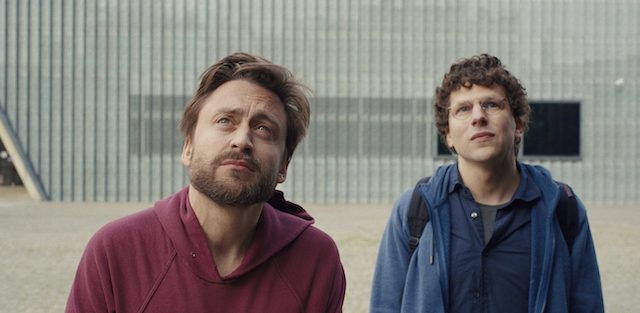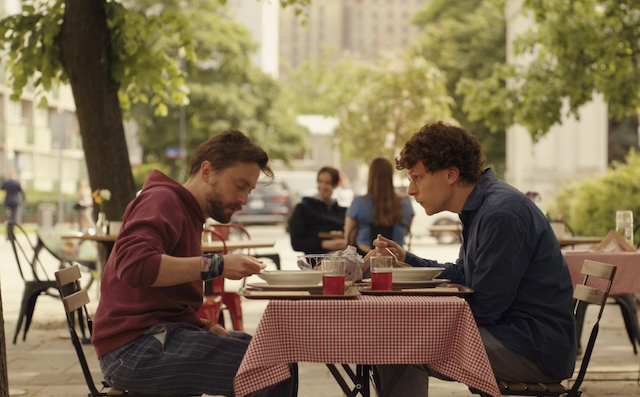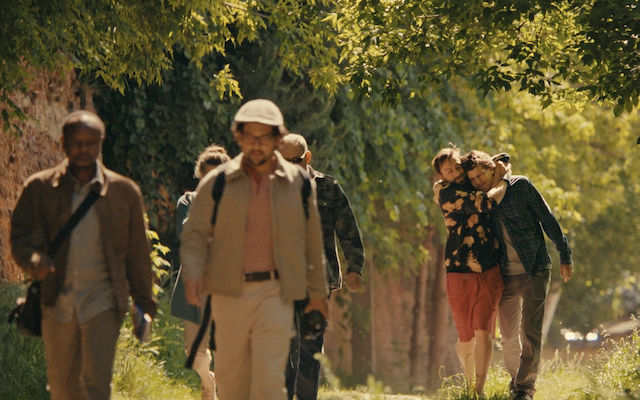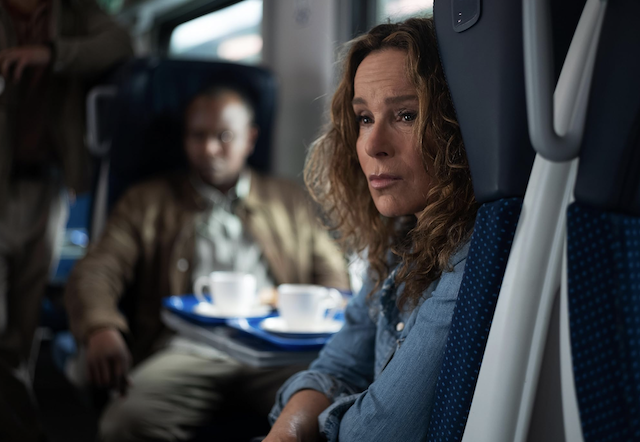
© 2024 SEARCHLIGHT PICTURES
A Real Pain : Mismatched cousins David (Jesse Eisenberg) and Benji (Kieran Culkin) reunite for a tour through Poland to honor their beloved grandmother. The adventure takes a turn when the odd-couple’s old tensions resurface against the backdrop of their family history.
Director : Jesse Eisenberg
Producer : Jesse Eisenberg, Ali Herting, Dave McCary, Ewa Puszczyńska, Jennifer Semler, Emma Stone
Screenwriter : Jesse Eisenberg
Distributor : Searchlight Pictures
Production Co : Topic Studios, Fruit Tree, Extreme Emotions
Rating : R (Some Drug Use|Language Throughout)
Genre : Comedy, Drama
Original Language : English
Release Date (Theaters) : Nov 1, 2024, Limited
Runtime : 1h 29m

© 2024 SEARCHLIGHT PICTURES
Q&A with Actor/Writer/Director Jesse Eisenberg, Actor Kieran Culkin
Q: Jesse, I was wondering if you could talk a little bit about your relationship with your great aunt. I was wondering if you could talk about how that sort of worked its way into the screenplay.
Jesse Eisenberg: Oh, yeah. Thank you so much for asking. Yeah, my connection to Poland really stemmed from this relationship that I had with this woman who died at 106.
She was, like, my dad’s aunt, and she grew up in that house that we filmed the movie in. In fact, I went to that house in 2008 to take a picture for her. It took two weeks to get to this thing, because it was before GPS, and we didn’t know where anything was. And I rented a car, and I got into a car accident, and it was my fault, but they blamed me, and then the cops took my passport, and I had to pay 200 equivalent in (Polish currency)zloty
I finally got to this house, took a picture for her, My wife and I flew back, blew it up at Kinko’s and gave her the best looking version of the pictures, she said, oh, yeah, that’s it, and I should put it away. But I had a relationship with her since I was like 17 years old, where I would see her every Thursday.
My relationship with her became so close in my 30s and my wife and I were not together for a brief period, I lived with her and she was just like the way we describe her in this film, she was like really tough, blunt and would yell at me, and it was like the only person in my life who did this thing to me that I clearly needed for some reason, whether it’s masochism or groundedness, I guess there’s a semantic issue not emotional, but basically I needed that kind of thing.
And so when I was conceiving her for this movie, it occurred to me that Benji, who can only feel comfortable when he’s experiencing something painful, you can only be in his element, kind of like that.
He only feels grounded when she hits him in the face. That was the grounding moment in his life, I was thinking I could use her, to tell the story of these two people that David wasn’t close with her. He was a yuppie who went to the Midwest for college and, thought, why would I hang out with my great aunt? Why would anybody do that?
And Benji who sees suffering and goes toward it, befriends her to the point where he’s losing his friendship with her over me as he does in the movie.
Kieran Culkin: Sorry, that was cool. I’ve been doing so much press with this guy, and it amazes me how much new shit I learn from you guys. We were just in another room, I thought you were gonna give the one I’ve heard, but that’s new, so cool!
Jesse Eisenberg: Thanks a lot. You could have asked me any time.
Kieran Culkin: Only in Q & A’s, it’s the only time you talk.
Jesse Eisenberg: Finally explained his character.
Kieran Culkin: That’s what the movie’s about. Ok, I’m on board.
Q : Kieran, when you first read the screenplay what surprised you about Benji?
Kieran Culkin: Everything to me, great script, There’s the scene where they meet in the airport, talking walking through security and stuff, immediately I was like I understand the history these guys have, I can picture how they grew up, I know who this guy is and how to play it I just want to get in there and do it. That’s it.
Every time I thought I knew how the guy was going to respond, he just said something else. You just don’t know what was going to come out of this guy’s mouth. And that just made me laugh. And it also made me not want to prepare just go out there and be like, I wonder how this is going to come out. And get in the room and do it. It was like the kind of character that Lin looked like. I wish I were articulate like you, and say interesting things.
Jesse Eisenberg: I like this way..I can take over for you and compliment you because that’s what I wanna do.
Kieran Culkin: Good.
Jesse Eisenberg: He’s a very intuitive person. My favorite kind of actor in the world, they like to live in the space of the character as opposed to background playwriting. I’ve worked with amazing actors before, and there’s a tendency, and I’m one of these people too, to show the writer or director you’ve been thinking about it, you realize parallels to Lear. Because that’s what I wanna do.
Kieran Culkin: It’s like my homework.
Jesse Eisenberg: Yeah, exactly. And you realize as a director, or as a playwright or whatever. It’s amazing that you did that interesting, unrelated thing. And Kieran is just the opposite of that. He just lived in the space of this person. That’s just, he just existed in this way. slept two hours a night.
He gave himself over to the unusual psyche. When he’s saying, oh, I can’t articulate it, it’s because he works viscerally, and as a director and co-actor, it’s the greatest gift in the world.
Kieran Culkin: That’s exactly what I was trying to say, bro.

© 2024 SEARCHLIGHT PICTURES
Q : I was wondering how you thought in the writing process about the dynamic between these two cousins, and once you got on the set, did that change for you, Jesse?
Jesse Eisenberg: No, I was initially thinking of playing Kieran’s role, which I’m so glad I didn’t, I would have played it that way I heard it which is like a little more rage forward, rather than lightness forward, the movie wouldn’t have been as good obviously, and the dynamic was different, but so it was so good.
It was different than I heard it, but it was just so good, and I’m like a pretty specific kind of neurotic writer, so I just want it to be in my head, this was a crazy feeling of holy shit, that’s great. And as the actor, it kicked me off balance too, which is correct for the dynamic.
Q: Yeah. I was wondering if you could talk a little bit about Jesse, the process of getting the production to Poland. And as an American filmmaker how you thought about this tour that you want to take.
Jesse Eisenberg: Yeah it’s a weird process when you do a movie overseas. Just such a strange process, because I didn’t get into the finances, but if I was a European citizen, I could have made this movie for 10 million dollars, but as an American, I didn’t. You can make it for three, because even though our movie, on the surface, it’s an American movie with notable, known actors or whatever.
It was just weird. But we had the greatest producer in the world, this woman, Ewa Puszczynska, in addition to our American producers, which is Emma Stone’s company. The producers in Poland, they did, Cold War, Ida, they won an Oscar for it.
Ewa Puszczynska, our producer, can open any door you don’t always get in but you have the conversation. These things were just like long conversations. Can we get onto this plane that has five rows because it’s to test pilots for their local airlines?
Can we get into a concentration camp that doesn’t ever allow movies to shoot there, but can we show them, make an argument that we’re trying to do the same things that they are doing, which is to show this place to the world. So we got our foot in every door.
Q : Yeah. I was wondering if you could talk a little bit about the filming of the dinners, the dinner sequence, and, it is this huge centerpiece of the film, and for both of you, what was that like? Jesse, how did you think about staging that? Kieran, how did you think about playing it?
Jesse Eisenberg: Kieran had a tough job.
Kieran Culkin: One thing, this guy wrote in the script that I chug a beer before I gotta pee. That I was supposed to chuck this whole beer, and while they all watched me quietly, which was a funny moment.
So I chugged somewhere in the neighborhood of I don’t know, 18 non alcoholic beers. Then this guy cuts it and it just looks like I take a sip and then I uncontrollably BLARGH..
Jesse Eisenberg: That was fun for us.
Kieran Culkin: That was fun for you, good. And you were like, you’re off camera, you know you didn’t have to say, It’s for the people. For the real reactions.
Jesse Eisenberg: You genuinely did it off camera.
Kieran Culkin: I did, yeah. That was a mistake.
Jesse Eisenberg: Yeah, that was a mistake.
Kieran Culkin: And you said it was weird about the food or something, but I don’t remember this at all, but I believe you.
Jesse Eisenberg: The moment, except for one he was telling me, I’m not even gonna bother you about the hummus. On the table, there was some uneaten hummus. Kieran like I would put the camera and you could have eaten that.
Now we have to sit with that big hummus. I was like, no one’s going to see that. He was like Yeah, they would, and I would have eaten the hummus. I was like, why is this the one thing in two months of working with you that you’re suddenly aware of the prop?
Kieran Culkin: Yeah, but it’s the thing in movies that drives me nuts when I see a table and there’s a cake with one bite with a fork on it that’s a little dirty and that was sitting there. Why can’t someone just eat the cake and leave.. It’s so stupid, but it bothers me so much. But it looked like a piece of setting instead of hummus. Can we just eat the hummus? No, we can’t. We sprayed it with wool. Can you bring some hummus over? I don’t know.
It’s the same with the bed. They were, like, crinkling the bed for 20 minutes to make it look like I slept in it. And I was like, may I just get in the bed? And then it looked like I’d been in bed. That’s weird, but it’s not…I’ll stop
Jesse Eisenberg: You have a very niche interest on the set, otherwise I have no idea what you’re thinking. When it comes to the prop, something was done wrong. But he’s very sweet about it. It’s this kind of picadillo with a prop, a day.
Kieran Culkin: I don’t care what the scene’s about. We’ll do that later. Let’s just work blah, blah, hummus.
Jesse Eisenberg: And I said to him, that was my scene about my relationship with him and saying I love him and I hate him and I want him. Then he told me the hummus and I’ve been thinking about my male relationships Today and how they’ve traumatized me. And he was like maybe you should hummus.

© 2024 SEARCHLIGHT PICTURES
Q : One of the reasons I wanted to bring up that scene was it does really show how you are blending tone in terms of, the humor and the really heavy stuff, which brings us to the sequence at Majdanek.(where the concentration camp located) I was wondering how you thought about that both in the writing process, but also in the editing process, and like, how you wanted that balance.
Jesse Eisenberg: Thank you so much. In terms of tone, I was aware in my mind that this is a holocaust themed movie and it made melee so uncomfortable even doing that because as we’re talking about it earlier, it just felt like a kind of hacky things to do, shortcut to drama is to set it at a concentration camp and it’s not real drama, it’s like a shortcut.
And I just wanted to make sure this was not a movie that took a shortcut to drama by having a scene at a concentration camp. That the movie was dramatic on its own terms, not taking advantage of a set piece that automatically, necessarily of course evokes great feelings in general audiences. Some of the self important set pieces, with a class, real relationship, these guys would realistically go to that place, and then try to get out of that headspace, break into a hotel and sneak onto the roof, or something like that.
That it felt to me like this movie could have been the most real, I didn’t have to censor how classy they were, because it was trying to offset this other thing, which is in bold letters, serious.
Q: Kieran, what Benji thought about the trip and like how he perceived his relationship with David.
Kieran Culkin: I think the trip was an excuse to be with David. Does that seem, at the beginning when he was like, you wanna go over the itinerary and he looks at..what is this? I’m just eating nuts, let’s hang out. I don’t think that was at all part of it, there just needs to be an excuse, there needs to be a reason.
Yeah, there was that. And I think he mentions, I don’t think he has a lot of people in his life that are like real, or that keep him grounded at all. There’s his grandma, who’s now gone, and then David, who’s drifting apart more and more. So this is a version of I would say desperate grab at what that is, but he doesn’t really know how to do that or articulate or anything. I don’t know if that makes sense. it’s your movie, of course.
Jesse Eisenberg: I approve of everything you just said.
Q: Jesse, I was wondering if you could talk a little bit about how you thought about shooting Majdanek in that moment, and Kieran what that day was like for you.
Kieran Culkin: He’s gonna have much better answers, so let’s horseshit out of the way first…I remember appreciating how it was written in the script of just, Because I’d never been to a concentration camp and I appreciated that. In the script, the group goes into this room, they see this. Next scene, they walk into this room, see this. it would have felt odd if there was scene work. if I was walking into one of these rooms and saw a T mark on the floor, or, stuff that made it a set. So I saw that and went, okay, and he had a longer process, which I guess you’ll explain how to do but that’s how we did it. A camera was set up with practical lights, we walked in, sometimes there would be a second take because of some technical thing, and we just solved it and moved on, which helped. So I gotta take it in as the character would in real time.
Jesse Eisenberg: I had an alternate scene written that I was close to doing which is…
Kieran Culkin: This is new, I’ve been doing Press for months. I didn’t know this, go ahead!
Jesse Eisenberg: The alternate scene was that Benji disappears on the tour and no one knows where he is. I see he’s smoking a joint because he can’t deal with it. And I’m horrified that this guy has done this in this place. And then he comes back to over to the group, and he’s weeping, instead of the group going are you fucking serious? They all hug him, and David, who’s furious that he has done this thing in this important place, is on the side, and we shortlisted everything, we shot this with the crew and took pictures of what the scene would look like and it ended with David looking at this group all huddling around Benji, who’s just blithering loudly and David’s just I can’t believe this motherfucker.
And then as we were there and like really, we went back to scout again and I was just like, that feels wrong. It feels wrong to do a scene. And it also feels wrong to maybe even have some humor in it. Because there would be humor from David being like, What the fuck, man? You get this?
So we didn’t do that scene. It’s for the best, too. I was really tempted to have some interesting scenes there. Because I thought this is such an opportunity to shoot a movie I should make it interesting. Then it just felt no, this should be its own thing.
Kieran Culkin: That’s so cool. I didn’t know that in the time you were there. I’m just learning this now. What’s cool about that I’m hearing that going, I want to see that. That was such a really interesting scene, but to have the ability to resist that, knowing it could be fun, but let’s pull back and not do it.I would say ballsy. Cool.
I like that. I agree. It was the right move, It makes sense. It’s a cool scene. It fits with all of this, but it also is better that it’s not there. Yeah. But a hard call. I agree. Cool. I didn’t mean to do that. I’m sorry..
Q : We have to wrap up, thank you all so much for being here.
If you like this Q&A, share your thoughts below!
Check out more of Nobuhiro’s articles.
Here’s the trailer of the film.

